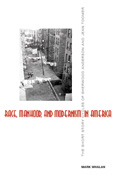Race, Manhood, and Modernism in America
The Short Story Cycles of Sherwood Anderson and Jean Toomer

- Author(s): Whalan, Mark
- Series:
- Imprint: Univ Tennessee Press
- Publication Date: 2007-09-30
- Status: Active
- Available in Paper: Price $34.00 | Buy Now
- Leaf eReader required for PDF ebooks
Race, Manhood, and Modernism in America offers the first extended comparison between American writers Sherwood Anderson (1876-1941) and Jean Toomer (1894-1967), examining their engagement with the ideas of “Young American” writers and critics such as Van Wyck Brooks, Paul Rosenfeld, and Waldo Frank. This distinctively modernist school was developing unique visions of how race, gender, and region would be transformed as America entered an age of mass consumerism.
Focusing on Anderson’s Winesburg, Ohio (1919), and Toomer’s Cane (1923), Race, Manhood, and Modernism in America brings Anderson and Toomer together in a way that allows for a thorough historical and social contextualization that is often missing from assessments of these two literary talents and of modernism as a whole. The book suggests how the gay subcultures of Chicago and the traumatic events of the Great War provoked Anderson’s anxieties over the future of male gender identity, anxieties that are reflected in Winesburg, Ohio. Mark Whalan discusses Anderson’s primitivistic attraction to African American communities and his ambivalent attitudes toward race, attitudes that were embedded in the changing cultural and gendered landscape of mass mechanical production.
The book next examines how Toomer aimed to broaden the racial basis of American cultural nationalism, often inspired by the same cultural critics who had influenced Anderson. He rejected the ethnographically based model of tapping the “buried cultures” of ethnic minorities developed by his mentor, Waldo Frank, and also parted with the “folk” aesthetic endorsed by intellectuals of the Harlem Renaissance. Instead, Toomer’’ monumental Cane turned to discourses of physical culture, machine technology, and illegitimacy as ways of conceiving of a new type of manhood that refashioned commonplace notions of racial identity.
Taken together, these discussions provide a fresh, interdisciplinary appraisal of the importance of race to “Young America,” suggest provocative new directions for scholarship, and give new insight into some of the most crucial texts of U.S. interracial modernism.
Mark Whalan is a senior lecturer in American literature and culture at the University of Exeter. He is the editor of The Letters of Jean Toomer, 1919-1924, and his articles have appeared in the Journal of American Studies, Modernism/Modernity, Studies in American Fiction, and Modern Fiction Studies.
